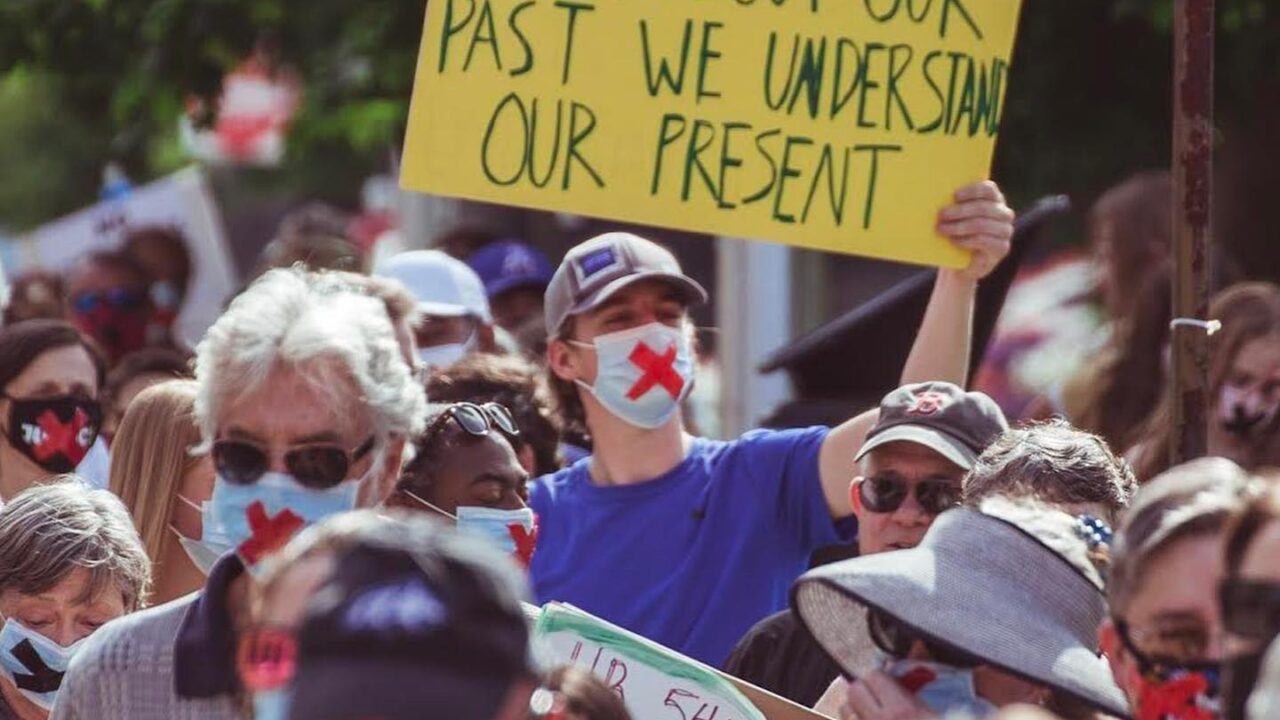How did an emerging national conversation about race — a conversation that a majority of Americans in 2020 said they wanted to have — become hijacked by an attack on a field called critical race theory?
Weeks after George Floyd’s brutal murder and the subsequent public outcry, far-right operative Chris Rufo launched an attack on racial justice, calling racial equity work within government “radical,” part of an “aggressive new racialist ideology” that maligns white people. Rufo’s attack informed a Trump executive order that prohibited government agencies from holding trainings to address issues such as systemic racism.
President Biden rescinded the Trump order — which was already being challenged in court — replacing it with an order to ensure racial equity processes within the federal government. But the tactic of silencing dialogue on race had already been adopted by Republican-controlled state legislatures across the country. Three states have passed versions of Trump’s executive order into law; twenty more have introduced copycat legislation. The argument is also cropping up as a central debate in school districts across the country. Here in New Hampshire, we are up against HB 544, the “divisive concepts” bill (now a budget amendment), which would prevent schools and government agencies from discussing systemic oppression, racism, or sexism.
Critical race theory (CRT), an academic practice that examines how racism manifests in institutions and structures, bears little resemblance to the wild right-wing claims that it normalizes intolerance, justifies violence, and limits opportunities for civic engagement. Yet, in this Orwellian attempt to divide us, Republicans have reframed racism as a “divisive concept” — and discussion of racism as discrimination against white people.
Silencing dialogue on systemic racism keeps us divided; denies the lived experiences of our families, friends, and neighbors, as well as our collective histories; and excludes the voices of historically underrepresented communities from decision-making processes in the political arena. Simply put, this is a war on our democracy, and we need strategies that can unite our communities. In New Hampshire, Rights & Democracy and other grassroots organizations are using multiple tactics to build opposition to this bill, including flooding a Senate hearing, engaging in public debates with key legislators, fostering sustained media coverage, involving supporters with calls to action, broadening our base through digital engagement, and addressing our state’s real crises by pushing for deep investment in communities.
At the start of our campaign, we anticipated that the bill would shift forms, and we wanted to build in space to incorporate feedback and information sharing with our allies. We assembled a small leadership team to develop and implement elements of the campaign strategy. The eight-person team, which intentionally included BIPOC members, women, and emerging and established leaders, was instrumental in evaluating our early messaging but did not hold together over the long term, primarily because the team members were overwhelmed with other work. For future campaigns, forming ad hoc teams for each stage might be both less burdensome for participants and more effective in the long run.
Getting good information about where each senator stood on the legislation created an opportunity for our members to get involved. We started with an anti-HB 544 petition to test our messaging and invited our members to sign up to attend a meeting with their senators. We built senate district teams and provided each team with a suggested agenda, volunteer roles, and suggested questions based on whether we believed the senator supported or opposed the bill. The senators revealed a surprising amount of information to the teams, which greatly informed our strategy. Still, creating entire teams to set up meetings was time consuming, and many of our members were unclear about expectations and roles. It would have been easier and more efficient to have a point person set up the meetings and then recruit volunteers to plan the agenda.
Based on what we learned in the senator meetings, we were able to identify priority senators. As the committee vote neared, we shifted our strategy away from setting up meetings to pressuring prioritized senators with constituent calls and emails. Eventually, we moved to emailing and phone banking supporters in priority senate districts to call or email their senator and the Governor.
Sustained public pressure and media coverage resulted in changes to the amendment’s language, but the budget amendment passed the Senate Finance Committee; later this month, the House and Senate Committees will prepare and vote on a compromise budget. Given the solid Republican majority in both houses, this is unsurprising. In the meantime, we continue to contact legislators. We are also holding an in-person demonstration, Courage Not Censorship: A March and Meditation on the Consequences of HB 544 and Divisive Concepts, in which participants will wear face masks with an “X” over the mouth and place books that impacted the way they think about “divisive concepts” on the steps of the State House.
Dog whistle tactics would not be as effective if people saw them for what they are. We need to name the right’s strategy for what it is: an attack on working people to keep us divided, undermine our collective demands, and maintain existing power structures. Part of our messaging around HB 544 has been to name what this bill is — “The White Supremacy Protection Act” — and what it does: “Silencing Voices. Dividing Neighbors. Denying History.” In our early message testing, we used “Silencing Voices, Dividing Neighbors. Embracing White Supremacy.” Our members felt that “Embracing White Supremacy,” though accurate, would turn off the public. They suggested “Denying History,” which is more explicitly connected to the bill’s language.
On Saturday, June 12th, we worked with our leaders and partners to hold a Courage Over Censorship march and rally. More than two hundred people at the New Hampshire Statehouse pushed for removal of the amendment. Many said that the rally — which lifted up how racial equity will benefit us all — was one of the most powerful events they had ever participated in.
Since last June, a historic number of Black Lives Matter rallies have been held in rural, mostly white communities. Even now, if you drive through communities in New Hampshire — the fourth whitest state in the country — the most common political sign you will see is in solidarity with Black Lives Matter. It is not surprising that such widespread support for racial justice is being met with opposition, but we must meet this opposition by creating the conditions to engage in deep national dialogue. We do that through organizing, naming the divisive culture war tactics, and recentering public attention on building unity and power.
As we work to oppose “divisive concepts,” Rights & Democracy is amplifying the ways that the American Rescue Plan ACT (ARPA) provides a much-needed safety net for New Hampshire residents in order to build support for legislative proposals that could address existing structural inequities. The anger and scapegoating tactics employed by divisive legislation like HB 544 are more easily countered when people’s basic needs are met. We see ARPA’s deep investment in our communities as an historic opportunity to go a step further and cultivate a new generation of leaders. With over $1.5 billion dollars being sent to New Hampshire alone to be used on a wide range of needs, from vaccination clinics to investing in state infrastructure, this is a concrete way we can work to unite rather than divide. Let’s organize with our neighbors and make sure that those funds go to where they are needed most.
Let’s do all of this — move our communities from division to unity and help our country live up to its promise of being a multiracial democracy where everyone can thrive.




